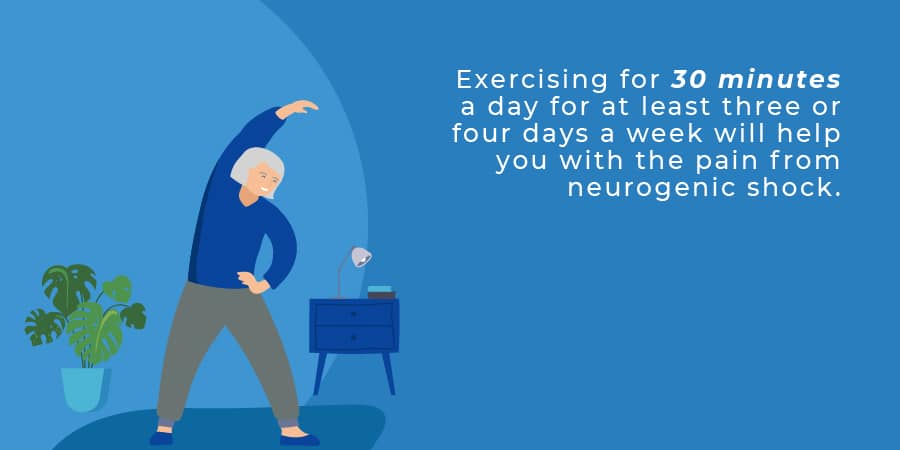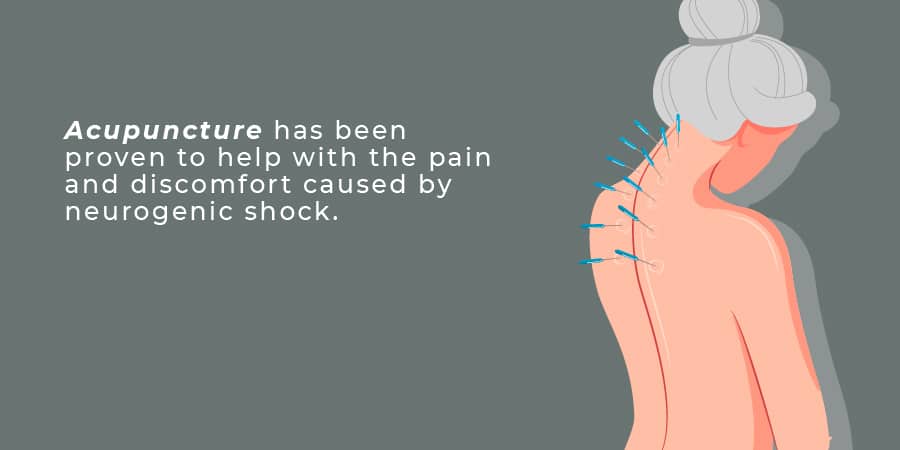
What is Neurogenic Pain?
What is Neurogenic Pain?
Learn how to identify neurogenic pain, neurogenic shock, and related risk factors.
Table of Contents
Defining Neurogenic Pain
Neurogenic pain is any sort of discomfort or pain that can be caused by lesions and damage to the nervous system of the body. This can result from the damage done to the peripheral nervous system, spinal system or the supraspinal nervous system.
Neurogenic pain can be very challenging and painful and even life-threatening for patients. While you might be able to avoid neurogenic pain, you can also have it treated too.
What is Neurogenic Shock?
Due to damage to your nervous system following a spinal cord injury, neurogenic shock and neurogenic pain is a situation when you have problems maintaining your heart rate as well as your blood pressure, and keeping your temperature constant.1
Since your blood flow is just too low, this is a dangerous condition which can be deadly, much like other forms of shock. Your cells can’t obtain the oxygenated blood they need to complete their tasks if your blood flow isn’t regular.
Spinal shock vs. Neurogenic Shock
There is a difference between spinal shock and neurogenic shock. When it comes to spinal shock, your muscles end up being limp and you don’t have your reflexes. That is not the case with neurogenic shock. Therefore, while they may be caused by similar situations and injuries, they are quite different in the symptoms they show.
Neurogenic shock is usually acquired due to a primary and secondary spinal cord injury. This is usually in the spinal cord above the level of T6. The tracts in the spine are often disrupted. A primary spinal cord injury can happen within just minutes of the impact and is known as direct damage to the axons and neural membranes in the spine. Secondary spinal cord injuries, on the other hand, do not happen so quickly.
Neurogenic shock is caused by both the primary and the secondary injuries.
The immediate results and consequences of neurogenic shock can be startling and very strong, up to and including shock. By overexciting the parasympathetic nervous system, the body will experience a vast decrease in heart rate which then decreases the pulse and can lead to a dangerous drop in blood pressure, which can result in shock.
Neurogenic Shock Causes And Risk Factors
Neurogenic shock and all neurogenic pain is most commonly caused by a spinal cord injury or injuries. When the nerves inside the spine get damaged, they no longer send the vital messages to the nerves throughout the body. Then, if the signals to the muscles in the blood vessels stop working, the vessels stop as well.
Neurogenic shock happens when blood vessels aren’t working like they should and do not push out enough blood to go through all of your body. You won’t experience blood loss but you also won’t experience proper circulation inside your system. The blood inside you then pools in your vessels and your pressure will drop dramatically.
Neurogenic shock can also be caused by a stroke or blood clot preventing your blood from circulating. Additionally, some people have also had neurogenic shock due to a bad reaction to spinal anesthesia, although that is far less common. Some medications, such as those combatting brain infections, can also cause neurogenic shock.
There are many risk factors that can contribute to getting neurogenic shock. Most of them revolve around injuries of some sort. The most common injuries that can lead to neurogenic shocks include car accidents, sporting injuries, and gunshot wounds to the spine. Any injury that can damage the nervous system or spinal cord are the ones most likely to cause neurogenic shock.
Symptoms and Signs of Neurogenic Shock

In order to best delegate treatment options, it is important to recognize the symptoms of neurogenic shock. Read about the signs below.2
Low Blood Pressure (Hypotension)
Low blood pressure is one of the most common signs of neurogenic shock. Blood pressure in your bodily system will decrease if you are suffering from neurogenic shock or neurogenic pain. Due to the decrease of muscular activity in your body’s blood vessels, your blood does not circulate as it should. This puts your organs in jeopardy. Organs will then be oxygen-starved and perish if blood does not deliver oxygen throughout the body.
In young people, hypotension is not worrisome. However, it can be quite serious with older patients if organs do not receive the right amount of blood flow. If you are suffering from low blood pressure due to neurogenic shock, you will feel dizzy, even when just standing up or sitting down. Typically, it is prescribed that you eat more salt, drink more floods, and relax the body when you are suffering from low blood pressure.
Low Heart Rate
Because of the neurogenic shock, you will have bradycardia, or a slow heart rate. This is another telltale sign of neurogenic shock. This denotes a heart rate that is lower than usual. A normal heart rate ranges between 60 and 100 beats per minute. The heart rate decreases to less than 60 beats per minute during a bradycardia incident. This exacerbates the body’s shortage of strong blood flow.
Your heart rate is different from your blood pressure. Blood pressure is the force of blood that is pressing against the walls of the blood vessels and that is not what a heart rate is.
Just because your pulse is faster doesn’t mean that you have higher blood pressure. Your blood vessels are supposed to expand to let blood pass through them when your heart starts to speed up.
There are other symptoms and signs of neurogenic shock. One of the most common ones is a body temperature change. A lack of blood flow affects the body’s ability to change and control its interior temperature. Because of this, your temperature will rise or fall wildly because of neurogenic shock.
Symptoms of Neurogenic Shock
There are even more signs of neurogenic shock, aside from blood pressure issues. They include:3
- dizziness
- nausea
- vomiting
- having blank stares
- fainting
- increased sweating
- anxiety
- pale skin
- difficulty breathing
- chest pain
- weakness from irregular blood circulation
- a slower heart rhythm
- faint pulse
- discolored lips and fingers
- decreased body temperature
Diagnosing Neurogenic Shock
If you think you have neurogenic shock, there are multiple ways for your doctor to determine if that is the case and what the next step in the process should be. In order to get a neurogenic shock diagnosis, the first thing your medical team will do is a physical examination to look for additional symptoms. Your doctors will also look for and monitor more blood pressure. Following that, there are a number of other tests that can be done to determine the severity of your possible neurogenic shock.4
CT Scan
MRI Scan
An MRI scan is a type of imaging examination that shows interior body structures like your spine. It can aid in the detection of any abnormalities in your spinal column. An MRI scan can be used in conjunction with a physical examination to determine the etiology of pain in the back and back problems and neurogenic shock.
Urinary Catheter
The medical device of a urinary catheter will also be used to measure the amount of your pee. You will be unable to urinate through your own power or experience incontinence as a result of some spinal injuries. Doctors might also use urine testing to identify any indications of illness.
Neurogenic Shock Prevention and Management

There are luckily many ways to avoid neurogenic shock and neurogenic pain. As you have likely expected, the best way to manage your neurogenic shock is to avoid it entirely.
Preventing Neurogenic Shock
Preventing a serious spain cord injury is the best way to avoid and manage your neurogenic shock and pain. You can do this by avoiding accidents such as car accidents and sporting injuries.
You should make sure that you always drive safely and sober to avoid serious damage to your back and your spine. You should always ride with a seat belt on as well. It is also important that you avoid any activities that can result in spinal damage, such as diving into bodies of water that are very shallow. That is a common way that many people injure their spines.
When To See A Doctor
Neurogenic shock can be a very serious condition and can in fact lead to life-threatening issues. That is why you should see a doctor as soon as possible when you are encountering symptoms associated with neurogenic shock.
After your initial appointment with your doctor, you should quickly contact them again if you notice major changes to your condition, such as your pain level increasing dramatically or your vital signs fluctuating a lot.
If you are experiencing chest pain, dizziness, or nausea then you should see your doctor as soon as you can or even visit the emergency room.

Neurogenic Shock Treatment
There are many different methods of coping with neurogenic shock. It is important to consult a medical professional, who will take your unique experience and condition into account, to construct a treatment plan. Below are some of the plausible treatment options.
Neurogenic Pain Medications
Since your blood pressure could be made very low by neurogenic shock, your doctor may decide to prescribe medication to maintain and manage that. Medication that helps tighten your blood vessels is called vasopressors and that is something your doctor may give you.
Medication is a common course that will be employed for neurogenic shock treatment. Some of the vasopressors that your doctor may prescribe for neurogenic shock include:
- Norepinephrine
- Epinephrine
- Dopamine
- Vasopressin
Other Treatments
When a spine injury induces neurogenic shock, the initial step in therapy is usually to stabilize the spine. In this circumstance, treating any other problems will be a major concern. To repair the damage, you may have to be restrained with movement restricted. Medical personnel will also ensure that you are able to breathe correctly. In some cases, this may need intubation and the use of a breathing machine.
After a spine injury has been treated, medical personnel will strive to restore your blood pressure to normal. One way they’ll utilize it is IV fluids. Doctors will also use the IV to provide drugs to the blood vessels and your heart to help them function correctly. Various drugs may be prescribed as needed to treat other symptoms.
Treatment Complications and Side Effects
Neurogenic shock treatment is vital because it is a condition that can be life threatening. The complications that can arise from the treatment are varied and can include life long pain and discomfort. But those complications are not very common and they are far less dangerous than the complications from neurogenic shock itself.
Another possible complication from the medication and treatment that you will receive for neurogenic shock is related to the IV fluids that are injected into your body. There is a chance that these fluids could lead to swelling throughout your body.
Outlook and Prognosis
Neurogenic shock can be fatal if it is not treated as soon as possible. But there is a chance that it can be properly and promptly dealt with and you may go on to live a long, fulfilling, healthy life. That depends on many contributing factors, of course, including:6
- The injuries to your vital organs
- Your medical history
- How long you waited to get treatment
- Your age
- The severity of the injury that led to your neurogenic shock
- How well your body responds to treatment
Treatment for Neurogenic Shock at J. Flower Health Institute

If you or someone you know experiences the pain and life-threatening symptoms of neurogenic shock, you should absolutely contact the professionals at J. Flower Health Institute. They are well aware of the complexities of neurogenic shock and know the best course of action to tackle and solve the problems that arise from them.
Our Therapies
Some of the therapies that you should expect when visiting J. Flower Health Institute definitely rely on certain medications that will avoid any irreversible damage to your body and its functions.
Vasopressors will probably be prescribed to you to help tighten the blood vessels in your body. You can expect to need medication such as norepinephrine, dopamine, vasopressin, and more.
You might also be given medicine to maintain and take care of your heartbeat if it is abnormal.
When getting help from J. Flower Health Institute you might also be subjected to IVs that will deliver IV fluids into your system. This is done to give you the medicine that you need and will manage many of your symptoms.
Some Questions To Ask Your Doctor
Of course it is only reasonable that you will have some questions for your doctor and your medical staff when you are seeking help for your neurogenic shock. It is very important that you have these questions compiled before your first appointment so you are ready to ask them when you are first introduced to your doctor and medical team.
There is no wrong question to ask but you should make sure that you pursue some of the most pressing ones, such as:
- Do I have or will I have organ damage due to my neurogenic shock?
- What should I do to prevent long term damage to my body?
- What is the outlook for my condition?
- Will I be able to return to work/school at some point? When would that be?
- How long will my treatment plan be?
What To Expect
When you visit J. Flower Health Institute, you should expect professional and courtesy and, of course, serious expertise. However, you should also expect multiple appointments. The first appointment will be you meeting with your doctor and going over your case but future appointments will include testing and monitoring your progress.
Getting over neurogenic shock is about treatment and recovery. The treatment will be done to stop the symptoms and dangers inside your body. The recovery will be about getting you ready to live the rest of your life. This entire process can sometimes take months but it will be done in the right hands at J. Flower Health Institute.
Resources
- https://www.healthline.com/health/neurogenic-shock#outlook
- https://www.webmd.com/brain/what-you-should-know-symptoms-neurogenic-shock#:~:text=The%20cause%20of%20neurogenic%20shock,the%20vessels%20stop%20working%20properl
- https://my.clevelandclinic.org/health/diseases/22175-neurogenic-shock#:~:text=Neurogenic%20shock%20is%20a%20condition,blood%20flow%20is%20too%20low.
- https://www.healthline.com/health/neuropathic-pain
- https://www.ncbi.nlm.nih.gov/books/NBK459361/
- https://www.sciencedirect.com/topics/medicine-and-dentistry/neurogenic-shock






